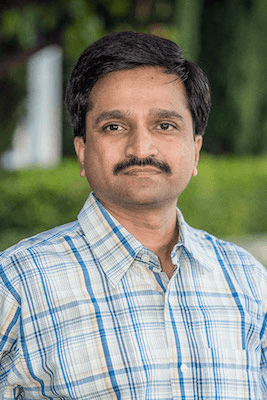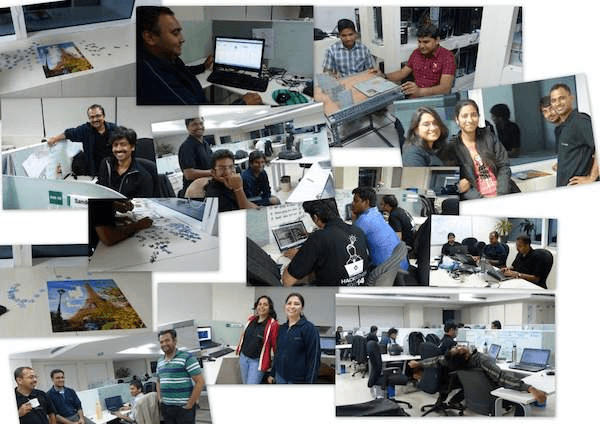
Administrator • 10yrs
"Great advice is good only when it's actually acted upon" - Milind Borate, Druva
Druva was founded in 2007 by Jaspreet Singh, Ramani Kothandaraman and Milind Borate. A company that builds product for backups and data protection aimed at enterprises that work in a wide variety of sectors.
In an exclusive interview with CrazyEngineers - Milind talks about Druva, the lessons he learnt while running this startup company, the attributes he thinks are essential for any entrepreneur, the importance of team work, various roadblocks in the way of Druva and how they dealt with them and a lot more.
Milind has over 13 years experience in enterprise product development and delivery. Prior to co-founding Druva he worked at Veritas Software as Technical Director for SAN-FS and served on the board of the Veritas patent filter committee. Milind has filed over 15 patent applications (4 allotted) and co-authored "Undocumented Windows NT" in 1998.
Read the following interview to know more.

CE: Could you please tell our readers more about Druva?
Milind: Druva provides integrated data protection and governance solutions for enterprise laptops, PCs, smartphones, and tablets. Our product inSync provides endpoint backup, IT-managed file sharing, data loss prevention, and rich analytics, and was ranked #1 by Gartner in both 2012 and 2013. Druva was founded in 2008 and our investors are Sequoia Capital, Nexus Ventures, and Tenaya Capital. Our headquarters are in Sunnyvale, California and we also have offices in India, the U.K., and Singapore.
CE: This one is a problem for all experienced people who aim to be entrepreneurs - You mention that your mother was not happy when you decided to quit your high paying job and start with Druva. How did you convince your family?
I could not really convince my mother that the decision was financially sound. But she and others in the family could feel that I was not happy just pursuing a high paying job.
CE: Druva has seen exceptional growth since the time of launch in 2007. What lessons have you learnt at Druva that you would like to share?
Milind: There are a lot of learnings. A few that come to mind:
a. The goal of a startup is to solve a real problem for a real customer. The goal of a startup is NOT acquisition or IPO. Those are just by-products.
b. It needs a team. In the initial days of a startup, a founder needs to be hands on with different aspects of business. But to ensure that the operations scale out, a founder must get the right people on board and provide them with the opportunities, freedom, and tools to succeed.
c. A startup roadmap needs to be flexible. It needs to continually monitor the market feedback and adjust the course. But more often than not, the market gives conflicting feedback. Sometimes feedback means you should change the course and at other times you should ignore the feedback. The trick is to figure what applies and what does not.
d. There's no need or means of defining a detailed 5 year road map. You only need a high level map for 5 years and a detailed road map for 2 or 3 quarters.
CE: "Druva" means "the North Star". How did you come up with this name? Druva has definitely reached heights. Where do you see Druva five years from now?
Milind: We strive to ensure that the data is safe and available under all circumstances. The data must be available whatever else happens, just like the north star stays at the same position even when other stars move or you move around.
CE: What personal attributes should an individual have to become a successful entrepreneur? What qualities of you as a person has helped Druva grow?
Milind:
a. Open mind. Urge to experiment. Zero fear of failure.
b. Hands on attitude. It's indispensable in the early days. Later on, it comes in handy to
stay in touch with the ground reality.
c. Keeping the Organization before self.
d. Good and quick judgment. No one person comes up with all great ideas. The entire organization contributes. As a founder, you would hear a lot of them every day and all of them, good or bad, small or big, smart or stupid, look the same at germination. A startup cannot spend time exploring all ideas. A founder needs to judge what should be explored further even though she does not come up with the idea by herself.

CE: The customers at Druva are diversified. Druva caters industried including Education, manufacturing, finance, retail, government, healthcare, technology, energy, etc. with big clients like Pfizer, Tesla, NASA, Harvard University, etc. How efficient should marketing be for any startup?
Milind: Since Druva has a horizontal product Druva's customer base seems to be diverse. But, if you look at the buyer profile, it starts to make sense. Druva's buyer is typically the IT function, which is again a horizontal function. Druva marketing focuses on the IT function and manages to reach out to different verticals without losing any efficiency.
Marketing efficiency is critical, but it’s also hard to measure. A startup needs to perform several small marketing experiments and continually measure them. Whenever a certain marketing experiment shows positive results, continue with it and drop the ones that fail.
CE: What according to you were the biggest roadblocks for Druva? How did you overcome the hurdles?
Milind: I would rather call these challenges. At every stage of growth, we faced different challenges. Each one looked like the biggest at that stage of growth. Back in 2008, getting the first customer was the biggest challenge. In 2009, getting VC funding was the biggest challenge. We faced other challenges along the way, such as building the Druva brand, scaling up the sales, and maintaining the product edge.
Overcoming the challenges is a three pronged strategy:
a. Get advice from people who have already done it. Druva has a great board of directors who are always ready to help. Also, in the tech industry fellow entrepreneurs are always willing to share their experiences.
b. Quick experiments. Fail fast, fail early.
c. Flawless execution. A strategy can only be as good as the implementation. Great advice is good only when it's actually acted upon.
CE: Finding the right team is of utmost importance for any startup. How did you meet your co-founders Jaspreet Singh and Ramani Kothandaraman?
Milind: We knew each other for only a short period of time before we decided to start Druva. I used to run a consultancy firm back then. Jaspreet and Ramani worked in different organizations. I came in touch with them in context of the consultancy work. It did not take us long to realize that we had similar dreams.
CE: Thank you for your time. Any message for our engineers who want to start their own Tech startup?
Milind:
It's a roller coaster ride. Do it for the sheer fun of it.
